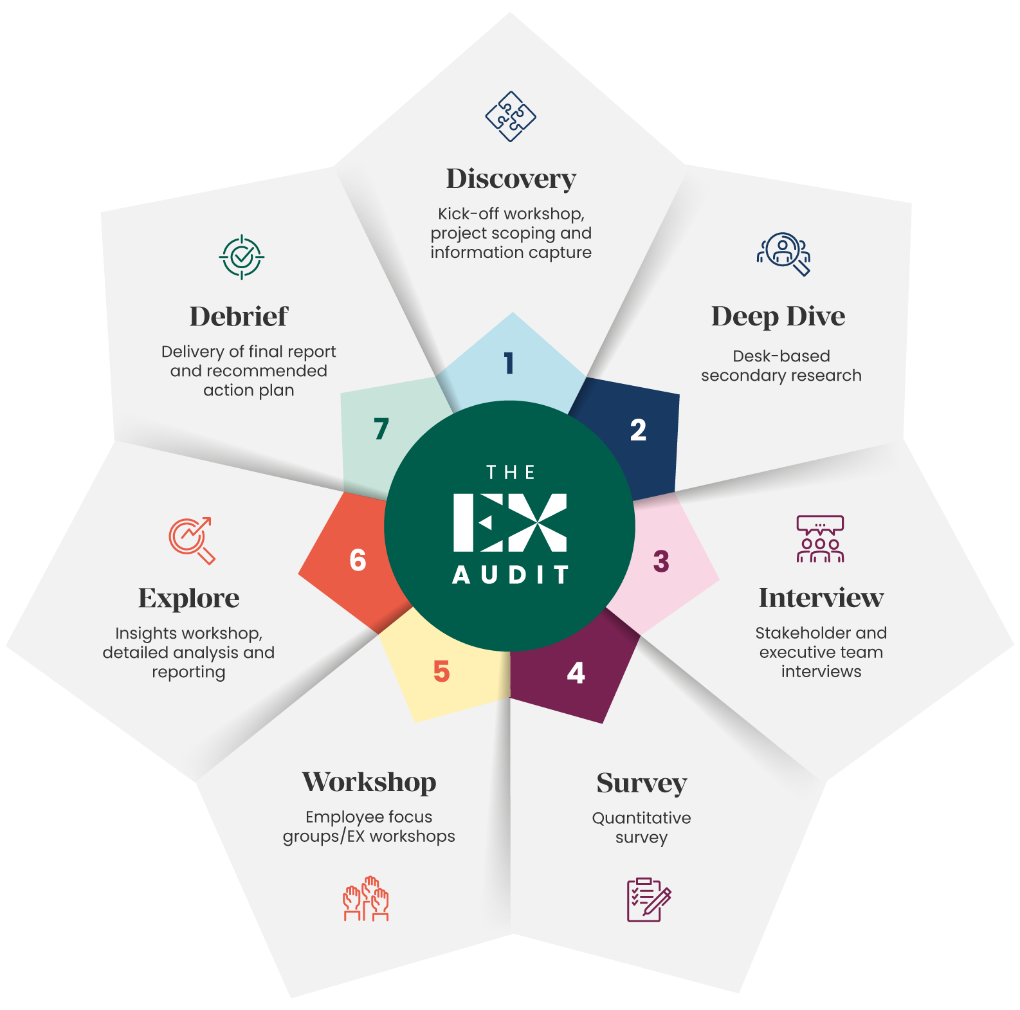What's an EX Audit and when might you want to conduct one?

Katie Austin
Minutes
17 May 2023
Employee Experience
If you’ve been following our socials, you’ll know that we recently launched our ‘EX Audit’ research offering to help practitioners better understand the state of their employee experience.
The response has been great! We’ve already had a lot of interest – and quite a few questions – from interested EX and engagement professionals in a wide variety of organisations.
The response has been great! We’ve already had a lot of interest – and quite a few questions – from interested EX and engagement professionals in a wide variety of organisations.
You can download an overview of our EX Audit methodology here, and we’re always happy to set up a meeting to introduce ourselves and talk through the process in person, but we thought it would be useful to cover off some of the most frequently asked questions here on LinkedIn.
The concept of an audit is well understood in some closely related professional areas - most notably internal communication, where the process is already well established - but it is not something EX practitioners tend to talk about at present (something we at The EX Space intend to change!)
So we wanted to start with the fundamentals – what an audit is and how it differs from other research activity, why you might want to invest in one and when is the right time to conduct one?
The concept of an audit is well understood in some closely related professional areas - most notably internal communication, where the process is already well established - but it is not something EX practitioners tend to talk about at present (something we at The EX Space intend to change!)
So we wanted to start with the fundamentals – what an audit is and how it differs from other research activity, why you might want to invest in one and when is the right time to conduct one?
What’s an EX audit?
We’re conscious the term ‘audit’, which has its roots in the world of accountancy, isn’t readily appealing to us ‘people people’! But please don’t let that put you off. An audit is simply an umbrella term for a robust, independent, multi-faceted piece of research designed to assess the health of one specific aspect of organisation’s activity. Traditionally this would involve a ‘roots and branch’ inspection of an organisation’s finances, for instance, but there is no reason at all why the concept of an audit can’t be applied to other areas, like employee experience and engagement.
Audits have been widely used by internal communication practitioners over the last two decades to help them understand what’s working and what isn’t working, how effective leaders and line managers are at communicating, what channels and tactics are preferred by employees, understanding of key strategic messages, behavioural integrity, effectiveness of listening and a whole host of other questions.
To the enlightened professionals who commission these projects, they are rewarded with rich, actional insights and a robust current state assessment – just what you need to guide your future strategy, identify priorities and assess progress. And this really is an audit’s primary purpose – to give you the insight you need to take stock, develop an effective strategy and drive through change.
We’re bringing the audit concept to EX, to help equip EX leaders with that same level of strategic insight. Indeed, with more than three decades of experience running IC and employee engagement audits for global organisations of all shapes and sizes, we think we’re pretty well placed to deliver this insight.
We mentioned above that an audit is a ‘robust, independent and multi-faceted piece of research’. In simple terms this means that a good audit will capture different types of data from a wide variety of sources, both primary and secondary.
Don’t confuse an audit with a ‘health check’ or any other quick and easy diagnostic. Audits by definition take time and utilise multiple data sources to gradually build up layer after layer of insight to paint a clear picture of the state of EX within your organisation.
To understand this, take a look at our 7 step methodology, summarised below. It includes an early phase of desk-based or secondary research where we look at all the insights you already have to hand. These differ from organisation to organisation, but might include HR data and reports, existing engagement or pulse survey data, output from exit interviews, anecdotal insights from managers and senior leaders, output from consultants and a multitude of other things. There’s no point repeating what you’ve already done! This is where the audit process really begins and, quite quickly, you can start to see patterns and themes emerge even at this early stage.
Audits have been widely used by internal communication practitioners over the last two decades to help them understand what’s working and what isn’t working, how effective leaders and line managers are at communicating, what channels and tactics are preferred by employees, understanding of key strategic messages, behavioural integrity, effectiveness of listening and a whole host of other questions.
To the enlightened professionals who commission these projects, they are rewarded with rich, actional insights and a robust current state assessment – just what you need to guide your future strategy, identify priorities and assess progress. And this really is an audit’s primary purpose – to give you the insight you need to take stock, develop an effective strategy and drive through change.
We’re bringing the audit concept to EX, to help equip EX leaders with that same level of strategic insight. Indeed, with more than three decades of experience running IC and employee engagement audits for global organisations of all shapes and sizes, we think we’re pretty well placed to deliver this insight.
We mentioned above that an audit is a ‘robust, independent and multi-faceted piece of research’. In simple terms this means that a good audit will capture different types of data from a wide variety of sources, both primary and secondary.
Don’t confuse an audit with a ‘health check’ or any other quick and easy diagnostic. Audits by definition take time and utilise multiple data sources to gradually build up layer after layer of insight to paint a clear picture of the state of EX within your organisation.
To understand this, take a look at our 7 step methodology, summarised below. It includes an early phase of desk-based or secondary research where we look at all the insights you already have to hand. These differ from organisation to organisation, but might include HR data and reports, existing engagement or pulse survey data, output from exit interviews, anecdotal insights from managers and senior leaders, output from consultants and a multitude of other things. There’s no point repeating what you’ve already done! This is where the audit process really begins and, quite quickly, you can start to see patterns and themes emerge even at this early stage.

But that’s not enough. Next is a qualitative research phase where we run structured interviews with senior leaders and other stakeholders to explore their views and perceptions. This is vital to ensure the insight delivered at the end of the audit supports and enable your organisational strategy and, importantly, that we give you what you need to win the support and backing of the key players.
Next comes the primary quantitative research, which usually takes the form of a bespoke survey. This step is optional – our audits are designed to be modular, which means they can be ‘flexed’ to reflect the client’s individual circumstances - and so it can be skipped if you already have a wealth of survey data we can tap into.
And finally, we host a series of workshops or focus groups to dig deeper into the themes identified in the previous phases. It’s an iterative process which adds layer upon layer of insight as we go, helping build up a rich current state picture.
That’s what we mean by robust and multi-faceted.
If you think back to the world of accountancy, an audit is always conducted by an independent third party. The rules in EX aren’t quite so rigid and so it is possible for you to conduct research in a similar way yourself, if you have the time and energy to devote to it. The process itself isn’t too difficult for an experienced researcher and there may be specialists in house you can bring on board.
However, we believe there is enormous value in bringing in external experts to conduct the audit on your behalf. This way you can guarantee a genuinely impartial view which really ‘gets to the truth’. Having delivered audit reports to dozens of executive teams over the years, we also know that it can be easier for someone external to the organisation to share some of the ‘warts and all’ insights that emerge from the audit process. And, of course, it isn’t just the data you’re buying – it’s the expert analysis and interpretation too.
Next comes the primary quantitative research, which usually takes the form of a bespoke survey. This step is optional – our audits are designed to be modular, which means they can be ‘flexed’ to reflect the client’s individual circumstances - and so it can be skipped if you already have a wealth of survey data we can tap into.
And finally, we host a series of workshops or focus groups to dig deeper into the themes identified in the previous phases. It’s an iterative process which adds layer upon layer of insight as we go, helping build up a rich current state picture.
That’s what we mean by robust and multi-faceted.
If you think back to the world of accountancy, an audit is always conducted by an independent third party. The rules in EX aren’t quite so rigid and so it is possible for you to conduct research in a similar way yourself, if you have the time and energy to devote to it. The process itself isn’t too difficult for an experienced researcher and there may be specialists in house you can bring on board.
However, we believe there is enormous value in bringing in external experts to conduct the audit on your behalf. This way you can guarantee a genuinely impartial view which really ‘gets to the truth’. Having delivered audit reports to dozens of executive teams over the years, we also know that it can be easier for someone external to the organisation to share some of the ‘warts and all’ insights that emerge from the audit process. And, of course, it isn’t just the data you’re buying – it’s the expert analysis and interpretation too.
When might you want to conduct one?
An audit is not something you would undertake regularly – it’s a comprehensive ‘deep dive’ research project designed to inform your strategy development. In a perfect world you might want to conduct an audit every time you review your strategy – so for a typical organisation you might undertake one once every three to five years. Certainly, there is little value in repeating an audit annually – and besides this would be a big chunk of budget to commit every year!
If our past experience is anything to go by, the following scenarios typically trigger the need for an audit:
Do any of those sound familiar? If any of these scenarios apply to you, please get in touch - drop us a line at hello@theex.space and we’ll set up a no-obligation introductory session to talk you through our process and understand more about your specific circumstances.
If our past experience is anything to go by, the following scenarios typically trigger the need for an audit:
- You’re a newly appointed EX/EE leader tasked with developing the organisation’s overarching EX/EE strategy
- You’re a recently promoted EX/EE leader looking to take stock and understand the current state
- You’re a mid-level practitioner reporting to a newly appointed senior leader with responsibility for EX/EE
- You’ve been in role for a number of years working hard to drive through improvements, but you’ve lost your way a little and want to deliver more value
- You want to make the case for additional investment in EX/EE (more budget!) and need some robust insight to support this
- You have a new CEO or HRD on board who is passionate about EX/EE and wants to see change
- You have identified significant issues in relation to employee’s experiences at work and you want to take action to address them
Do any of those sound familiar? If any of these scenarios apply to you, please get in touch - drop us a line at hello@theex.space and we’ll set up a no-obligation introductory session to talk you through our process and understand more about your specific circumstances.

